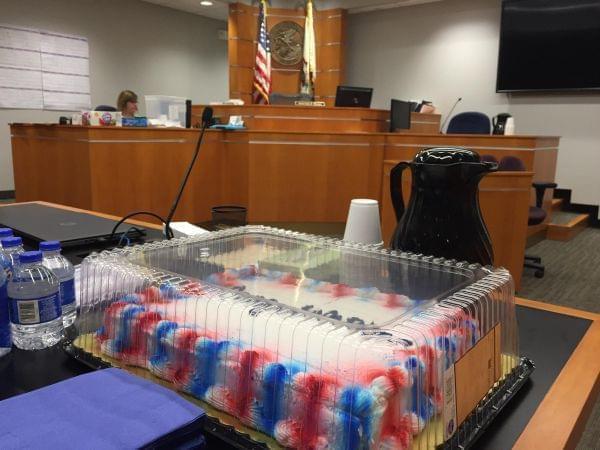Treatment Court Offers Second Chance for Veterans

Participants who finish the treatment court program, which involves treatment or therapy, are recognized with a "graduation" in the courtroom. In Oct., four veterans graduated from treatment court in Peoria County. Cass Herrington/Peoria Public Radio
Illinois Circuit Courts will be required to have a special treatment court for veterans, starting next year. The initiative aims to reduce recidivism among soldiers who are struggling with mental health and addiction. The tenth circuit court in Peoria already offers a veteran’s treatment court and is awaiting certification to meet the Jan. 1st deadline.
Army combat veteran Ricky Jenkins says before things got better, he was about to give up on life.
“I was to the point that I would sit out in my garage and get so drunk and just sit out here and cry and cry and cry," Jenkins said. "I’d beg for God to help me, to intervene. Because every day, it was the same thing.”
Jenkins suffers from PTSD. He spent 16 years in the military. The day he calls the “worst in his life”, he was in Iraq. He watched as a 150 foot flame engulfed a building where soldiers, civilians and children were staying.
“These people were coming out of this building on fire," Jenkins said. "All I could do was sit there and watch it and cry."
He says he was overcome with anger that he couldn’t save the victims. And those emotions haunted him, long after he returned home.
“I’ll never forget it. Not as long as I live, every time I see fire, I think about it,” Jenkins said.
Jenkins says he didn’t seek therapy because he didn’t want to labeled a “sissy.” He says, it was that night when he’d been up drinking that his life was saved -- by a civilian.
Ginger Garner, a veterans justice outreach specialist, was assigned to Ricky Jenkin’s case through the treatment court program.
“He is a poster veteran. He has lived it. He has been through it all, with multiple deployments and would probably go back if he could,” Garner said.
She adds, with deployments often come physical and psychological injuries.
“The veteran’s treatment court program is designed to be able to reach out to them in jails and in the community," Garner said. "So they can get the services they need, and hopefully not be back here, to address the problems that got them here in the first place.”
Jenkins wound up facing three to five years in prison.
“A couple of guys tried to jump me in a bar over a conversation I was having with a girl. It was totally innocent, but I’m not the kind of person that’s going to sit there and take it,” Jenkins said.
He says he left the bar that night to get away from the situation, but was arrested later that evening.
“I should have never been there," Jenkins said. "I’m 49 years old, I should know better.”
Jenkins went to veteran’s treatment court where he was required enter a guilty plea. Veterans who go through the program are then required to to get treatment through the VA, seek therapy, and regularly check in with the court.
“The judge is spending one-on-one time with the participant, talking about what’s going on in their life, and giving them praise when they have really done well, and sometimes imposing a sanction when it’s necessary, due to negative behavior," Lisa Wilson, 10th Circuit Court associate judge said.
Judge Wilson oversees the veteran’s treatment court program, along with the county’s three other special courts set up to address DUI, drug addiction and mental health. When court’s in session, Wilson can sometimes be seen coming down off the bench, talking with the defendant on their level.
“I really do try to build a rapport with each of the participants because we know that through research that’s been done on problem-solving courts, that that is a really a key component to the success of the participant and to the program,” Wilson said.
In fact, when I asked participants who completed the program what was the key to their success, they each identified an individual who worked with them. Whether it was the judge, the probation officer...in Ricky Jenkin’s case, it was Ginger Garner.
“It’s very rewarding. It’s neat to see people address needs that they have," Garner said. "It makes them stronger and then they’re able to provide support to other people who are in a similar position.”
Ricky Jenkins graduated from veteran’s treatment court last month, along with three others and Judge Wilson brought a cake to the courtroom. Jenkins says he’s taking classes to become a counselor, so he can help and mentor other veterans struggling with PTSD.
Links
- In One Ohio County, Police Try Something Different: Door-to-Door Interventions For Drug Users
- Congressional Group Focused on Fighting Drug Abuse Pushes Bills Aimed at Treatment, Prevention
- To Fight Drug Addiction, Hospitals Hire Recovering Addicts
- Drug Court To Honor Graduates Who Complete ‘Hardest’ Assignment
- Chicago Mayor Wants Illinois To Reform Drug Laws
- Drug Sentencing Guidelines Reduced For Current Prisoners
- Regional VA Hospitals Adapt To Veterans Choice Program
- Those Charged With Helping Veterans Share Their Views On Veterans Choice
